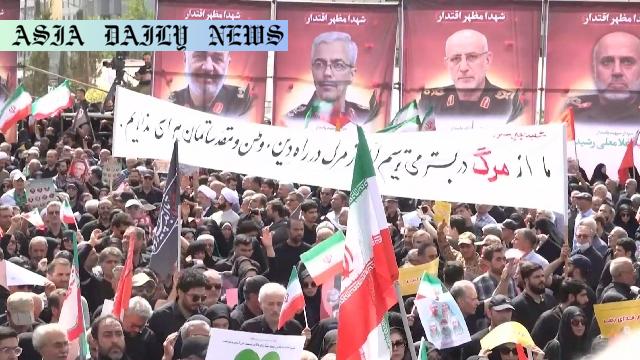Funeral crowds mourn and show unity in Tehran amidst Israeli attacks.
Iran held a state funeral in Tehran for more than 60 victims of Israeli strikes.
Victims included high-ranking military personnel and nuclear scientists.
Citizens mourned with flags and photos while expressing unity.
Some demanded justice; others called for adherence to a ceasefire.

Iran Unites in Mourning Following Devastating Attacks
Tehran, Iran became the focal point of deep sorrow and determination as the country held a state funeral for over 60 citizens killed in Israeli attacks that began on June 13. These tragic events not only claimed the lives of civilians but also high-ranking military officers and nuclear scientists, compounding the nation’s loss. The main square and adjoining streets of Tehran were overwhelmed with citizens holding national flags and portraits of the deceased as they mourned collectively.
Iran’s state-run media covered the ceremony extensively, showcasing the nation’s efforts to honor the lives lost while emphasizing its resolve. While Supreme Leader Ayatollah Ali Khamenei remained absent due to heightened security risks, his influence loomed large over the gathering. Many attendees carried banners and spoke decisively of unity, some demanding appropriate retaliation while others advocated for the observance of a ceasefire. The funeral symbolized a blend of grief and resilience among the population.
Complex Political Implications of the Attacks
This recent wave of attacks underscores the growing regional tension in the Middle East. The victims, particularly the inclusion of key military officers and nuclear scientists, highlight the severity of Israel’s offensive measures. These targeted strikes aim to undermine Iran’s defense and nuclear program, but in turn, stoke the flames of discord between the nations. For Iran, Saturday’s ceremony was not just an act of mourning but also a demonstration of defiance.
Attendees urged leaders to either ensure strong diplomatic negotiations for a ceasefire or prepare for decisive action in retaliation. Meanwhile, international watchers are weighing in on the humanitarian cost of this escalating conflict. Advocacy groups have called on both nations to adhere to international norms to prevent loss to civilian lives moving forward.
Public Sentiment Reflects Unity and Determination
Among the thousands of mourners, a prevailing sentiment of solidarity and determination emerged. The attack, though devastating, has created a unified call among the people to defend their nation and its sovereignty. Some citizens expressed their grief while holding signs that read ‘We stand united,’ further cementing a sense of national purpose. Meanwhile, others voiced concerns, stressing the importance of finding peaceful resolutions to end the cycle of violence.
As the state funeral concluded, the underlying message was clear: the nation would not be divided by external forces. The collective mourning and resilience displayed further solidified Iran’s stance on the global stage as it navigates through one of its most challenging periods in recent memory.
Commentary
A Tragedy that Reflects Broader Tensions
The state funeral in Tehran is a stark reminder of the devastating toll of geopolitical tensions in the Middle East. The loss of over 60 lives is not just a national tragedy but a global call for introspection on the nature of conflicts that target both military figures and civilians alike. While the event served as a platform for national unity, it also highlighted the grave repercussions of the current trajectory of the Israel-Iran conflict.
National Unity Amidst Adversity
The large turnout speaks volumes about the Iranian people’s response to national tragedies. The imagery of mourners holding national flags and victim portraits is deeply moving and a reminder of the human cost of political disputes. While some called for retaliation, others advocated for life-saving measures such as the enforcement of a ceasefire. This duality of thought among citizens reflects a shared desire for peace but also the readiness to defend sovereignty when provoked.
The Need for Conflict Resolution
The escalation of attacks, particularly those targeting individuals critical to Iran’s defense systems, raises several questions about the ethics of war and international diplomacy. While both nations have their own narratives, the high civilian toll asks for a more humane and balanced approach to conflict resolution. The global community must push for conversations that prioritize dialogue over aggression, ensuring sustainable solutions.
In conclusion, the events following the Israeli attacks aren’t just about mourning losses but also about reflecting on the path forward. Iran’s unity shines as a beacon of resilience for its people, but it also raises concerns about the expanding nature of these disputes. Hopefully, this somber event serves as a catalyst for meaningful discussions aimed at achieving peace and ending cycles of violence.


